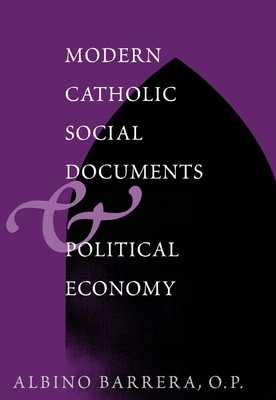
- We will send in 10–14 business days.
- Author: Albino Barrera
- Publisher: Georgetown University Press
- ISBN-10: 0878408568
- ISBN-13: 9780878408566
- Format: 15.6 x 24.1 x 2.6 cm, hardcover
- Language: English
- SAVE -10% with code: EXTRA
Modern Catholic Social Documents and Political Economy (e-book) (used book) | bookbook.eu
Reviews
Description
As western economics have moved from feudalism to industrialism to the information age, Catholic social thought has kept pace, responding to the economic realities of the day. Linking Catholic social teaching with modern economic theory, Albino F. Barrera examines the changing political economy embedded within the moral theology and social justice documents issued by the Chruch during the last one hundred years. Barrera discusses the evolution of Catholic social teachings from scholastic thinking on the concept of the "just price" to a modern emphasis on the importance of a living wage. As the conduct of economic life according to traditional custom and common law has given way to institutional and impersonal market forces, these teachings have moved from a preoccupation with personal moral behavior to an intense scrutiny of the structures of society. Amid these changes, the Church's social documents have sought to address systemic shortcomings as a means of promoting the common good through economic justice. Barrera looks ahead to the challenges posed by a postindustrial society characterized by a global, knowledge-based economy, arguing that Catholic social thought will likely shift its focus from advocacy of the living wage to demands for greater equality of socioeconomic participation. Written for scholars and students of economics, theology, and political science interested in religous social thought, this book bridges the gap between moral theology and economic theory.
EXTRA 10 % discount with code: EXTRA
The promotion ends in 18d.14:59:06
The discount code is valid when purchasing from 10 €. Discounts do not stack.
- Author: Albino Barrera
- Publisher: Georgetown University Press
- ISBN-10: 0878408568
- ISBN-13: 9780878408566
- Format: 15.6 x 24.1 x 2.6 cm, hardcover
- Language: English English
As western economics have moved from feudalism to industrialism to the information age, Catholic social thought has kept pace, responding to the economic realities of the day. Linking Catholic social teaching with modern economic theory, Albino F. Barrera examines the changing political economy embedded within the moral theology and social justice documents issued by the Chruch during the last one hundred years. Barrera discusses the evolution of Catholic social teachings from scholastic thinking on the concept of the "just price" to a modern emphasis on the importance of a living wage. As the conduct of economic life according to traditional custom and common law has given way to institutional and impersonal market forces, these teachings have moved from a preoccupation with personal moral behavior to an intense scrutiny of the structures of society. Amid these changes, the Church's social documents have sought to address systemic shortcomings as a means of promoting the common good through economic justice. Barrera looks ahead to the challenges posed by a postindustrial society characterized by a global, knowledge-based economy, arguing that Catholic social thought will likely shift its focus from advocacy of the living wage to demands for greater equality of socioeconomic participation. Written for scholars and students of economics, theology, and political science interested in religous social thought, this book bridges the gap between moral theology and economic theory.


Reviews